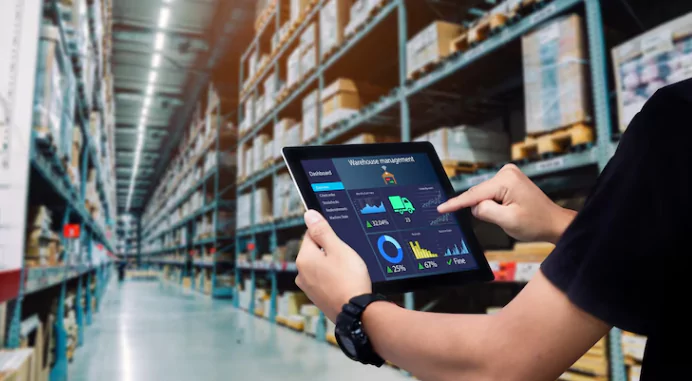Stacket 3PL Prep and Fulfillment Warehouses
06 May

What Are Warehouse Management Systems, and Why Do They Matter Today?
In today’s high-speed logistics world, businesses can’t afford operational delays. That’s where Warehouse Management Systems (WMS) come in. These digital solutions serve as the backbone of modern warehousing by helping operators oversee, track, and optimize day-to-day operations. From inventory location tracking to shipment scheduling, WMS tools eliminate guesswork and streamline activities, allowing companies to run leaner, faster, and more accurately.
- How Do Modern Warehouses Use Technology to Stay Ahead?
- What Makes a Warehouse Truly “Smart”?
- How Are Warehouse Features Evolving with Market Demands?
- Why Are 3PL Warehousing Solutions Gaining Traction?
- What Role Does Automation Play in the Future of Warehousing?
- How Do Warehousing Features Impact Order Accuracy and Speed?
- Can 3PL Services Help Small and Mid-sized Businesses Compete?
- Why Are Strong Warehouse Management Systems Essential in E-commerce?
- What Are Some Game-Changing Innovations in Warehousing?
- How Can You Prepare for the Next Era of Warehouse Features?
How Do Modern Warehouses Use Technology to Stay Ahead?
Technology isn’t just enhancing operations—it’s redefining them. Modern warehouses are no longer static storage hubs; they are dynamic, data-driven environments powered by real-time analytics and automation. With barcode scanning, RFID systems, IoT sensors, and cloud platforms, warehouse staff can monitor every movement within the facility. This digital visibility, powered by robust Warehouse Management Systems, ensures fewer mistakes, better accountability, and much faster response times when issues arise.
What Makes a Warehouse Truly “Smart”?
The concept of Smart Storage Solutions is gaining attention for good reason. These are systems that learn from behavior, anticipate needs, and respond proactively. Imagine shelves that automatically signal when inventory levels drop below a threshold or systems that suggest optimal storage placements based on product demand trends. Combined with Warehouse Management Systems, these intelligent features help maximize every square foot of space while minimizing labor and handling costs. It’s a smarter way to store—and to scale.

How Are Warehouse Features Evolving with Market Demands?
Years ago, having a clean and spacious facility might have been enough. Today, customers and business partners expect much more. Warehouse features now often include climate-controlled zones, pick-to-light systems, robotic assistance, and AI-based analytics. Efficiency, sustainability, and safety all play crucial roles in how a warehouse is judged. The integration of these cutting-edge features with Warehouse Management Systems helps businesses stay competitive and deliver a seamless supply chain experience.
Why Are 3PL Warehousing Solutions Gaining Traction?
As businesses grow, managing logistics in-house can quickly become overwhelming. That’s why many are turning to 3PL warehousing solutions—third-party logistics providers that handle everything from storage to delivery. These solutions offer flexible scaling, reduced infrastructure costs, and professional logistics management. Combined with top-tier Warehouse Management Systems, 3PL services enable companies to adapt faster to market changes without compromising performance or accuracy.
What Role Does Automation Play in the Future of Warehousing?
Automation is not a luxury—it’s becoming a necessity. The future of warehousing is deeply tied to robotics, AI, and machine learning. Whether it’s conveyor systems that sort packages or drones conducting inventory checks, automation reduces human error and speeds up operations significantly. Warehouse Management Systems provide the digital infrastructure that connects these technologies into a cohesive workflow, ensuring data flows freely and tasks are executed with precision.
How Do Warehousing Features Impact Order Accuracy and Speed?
Speed alone isn’t enough; accuracy is just as crucial. Advanced warehousing features—like real-time tracking, automated replenishment, and intelligent slotting—enhance both metrics. When powered by reliable Warehouse Management Systems, these features make it easier to locate inventory, reduce mispicks, and cut down cycle times. The result? Faster order fulfillment, fewer returns, and improved customer satisfaction—every business’s ultimate goal.
Can 3PL Services Help Small and Mid-sized Businesses Compete?
Absolutely. 3PL services are no longer just for large enterprises. In fact, they level the playing field for smaller businesses by giving them access to large-scale resources without the upfront investment. With access to expertly managed facilities and state-of-the-art Warehouse Management Systems, even startups can provide reliable, fast shipping that rivals major retailers. This democratization of logistics is one of the most exciting shifts in the warehousing space.
Why Are Strong Warehouse Management Systems Essential in E-commerce?
E-commerce has transformed expectations. Customers want their orders shipped fast, tracked in real-time, and delivered flawlessly. Behind every smooth online purchase lies a strong Warehouse Management System. These platforms ensure inventory is accurate across sales channels, orders are prioritized correctly, and fulfillment processes run without hiccups. Without such systems in place, delays and errors are inevitable—and in today’s competitive market, that’s a risk most can’t afford to take.

What Are Some Game-Changing Innovations in Warehousing?
Warehousing has seen its fair share of revolutionary tech, but some tools stand out as truly game-changing. AI-driven demand forecasting, autonomous mobile robots (AMRs), and blockchain inventory tracking are just a few innovations changing how companies manage logistics. Yet, none of these can operate efficiently in isolation. It’s the Warehouse Management Systems that tie these innovations together, ensuring seamless integration and actionable insight across the supply chain.
How Can You Prepare for the Next Era of Warehouse Features?
Being proactive is key. Companies must evaluate current warehouse features, forecast future needs, and invest in technologies that offer long-term value. This includes not just hardware like robotics or smart shelving, but also scalable, cloud-based Warehouse Management Systems that grow with your operations. Partnering with platforms like stacketwarehousing can help businesses stay ahead of the curve and future-proof their warehousing operations.
In conclusion, warehouse operations are evolving rapidly, and businesses must adapt or risk falling behind. Whether you’re a small business exploring 3PL warehousing solutions, or a large enterprise upgrading to smart storage solutions, one thing is clear: effective Warehouse Management Systems are the engine that drives it all. At stacketwarehousing, we’re committed to helping businesses unlock their full operational potential through innovative, tailored warehousing support.
